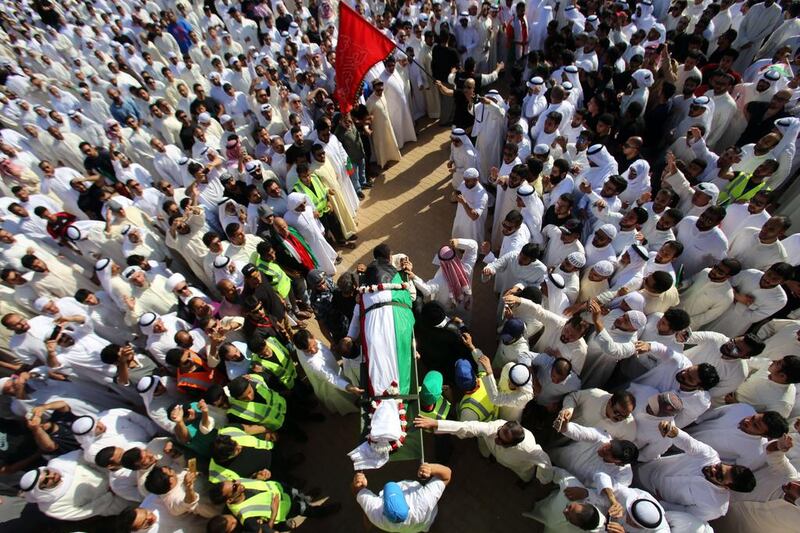KUWAIT // Kuwaiti mourners gathered on Saturday to bury victims of a Shiite mosque bombing that killed 27 people, as the government said the country would face the attack with “unity and solidarity”.
It declared Saturday a day of mourning.
More than 220 people were injured in the ISIL-claimed assault on Friday, which was one of Kuwait’s worst bombings and the first to attack a mosque.
Officials said the bombing, which targeted 2,000 worshippers during Friday prayers, was clearly meant to stir enmity between the country’s majority Sunni and minority Shiite communities, and harm the comparatively harmonious ties between the sects in Kuwait.
The information ministry reiterated what it called the government’s strong stance on the freedom of religion and opinion, noting that these were rights protected by the constitution.
In a show of support, condolences began to be accepted on Saturday for a three-day period at the Grand Mosque, the largest place of Sunni worship in Kuwait.
Sheikh Mohamed bin Zayed Al Nahyan, Crown Prince of Abu Dhabi and Deputy Supreme Commander of the UAE Armed Forces reiterated the UAE’s support of Kuwait in its efforts to combat terrorism, extremism and violence and offered condolences to the people of Kuwait.
“The acts that target mosques and innocent people during this holy month are in fact against Islam and its tolerant teachings calling for compassion and forgiveness,” he said during a phone call with Kuwait’s emir, Sheikh Sabah Al Ahmad Al Jaber Al Sabah, late on Friday.
The owner of the car that took the bomber to the Al Imam Al Sadeq mosque had been detained, Kuwait’s information ministry said on Saturday, adding that it was now looking for the driver who vanished shortly after the blast.
A security source said that “numerous arrests” had been made in connection with the bombing.
At the burial site for some of the victims in the district of Sulaibikhat, mourners waved Kuwaiti flags and carried large banners in red, black or green that are typical of Shiite funerals.
Chants from the crowd included “Brothers of Sunni and Shia, we will not sell out our country,” “No Sunni, no Shia, we are one Islam”, “The martyrs are the beloved of God” and “Down with Daesh! Down with Daesh”.
One group of mourners said they had travelled from Qatif in Saudi Arabia where 21 people were killed by an ISIL suicide bombing in May.
Two Iranian nationals were among those killed, Tehran’s foreign ministry spokeswoman Marzieh Afkham was quoted as saying by Iranian state media on Saturday.
The relatives of seven of those killed wept and prayed over their shrouded corpses at a mosque on Saturday, where they were waiting to be taken to the Shiite holy cities of Najaf and Karbala in Iraq for burial.
Kuwaiti newspapers said the attack aimed to undermine national unity by fanning sectarian tensions.
“It is a black day ... in which Kuwait woke up to a spiteful bombing that aimed foremost to undermine its national unity and social structure,” said Al-Qabas in a front-page editorial.
Al Anbaa agreed, saying: “The message of the despicable terrorist who blew himself up is clear: an attempt to ignite hateful strife between the Kuwaiti people.”
Shiites make up between 15 and 30 per cent of the population of Kuwait, a mostly Sunni country where members of both communities live side by side with little apparent friction.
“We will cut the evil hand that interferes with our homeland’s security,” interior minister Sheikh Mohammed Al Khaled Al Sabah was quoted as saying by state news agency Kuna.
Kuwait has stepped up security to the highest level at state-run oil conglomerate Kuwait Petroleum Corp (KPC) and its affiliates, Kuna also reported.
The cabinet announced after an emergency meeting on Friday that all security agencies and police had been placed on alert to confront what it called “black terror”.
Justice and Islamic affairs minister Yacoub Al Sane said additional security measures would be taken around mosques and places of worship.
An ISIL-affiliated group in Saudi Arabia, calling itself Najd Province, named the bomber as Abu Suleiman Al Muwahed and said on social media that he had targeted a “temple of the apostates” – a term the group uses to refer to Shiites, whom it regards as heretics. It did not provide details of the bomber’s nationality.
The group urged its followers on Tuesday to step up attacks during Ramadan against Christians, Shiites and Sunnis fighting with a US-led coalition against the extremist group.
* Reuters with additional reporting by Agence France-Presse





